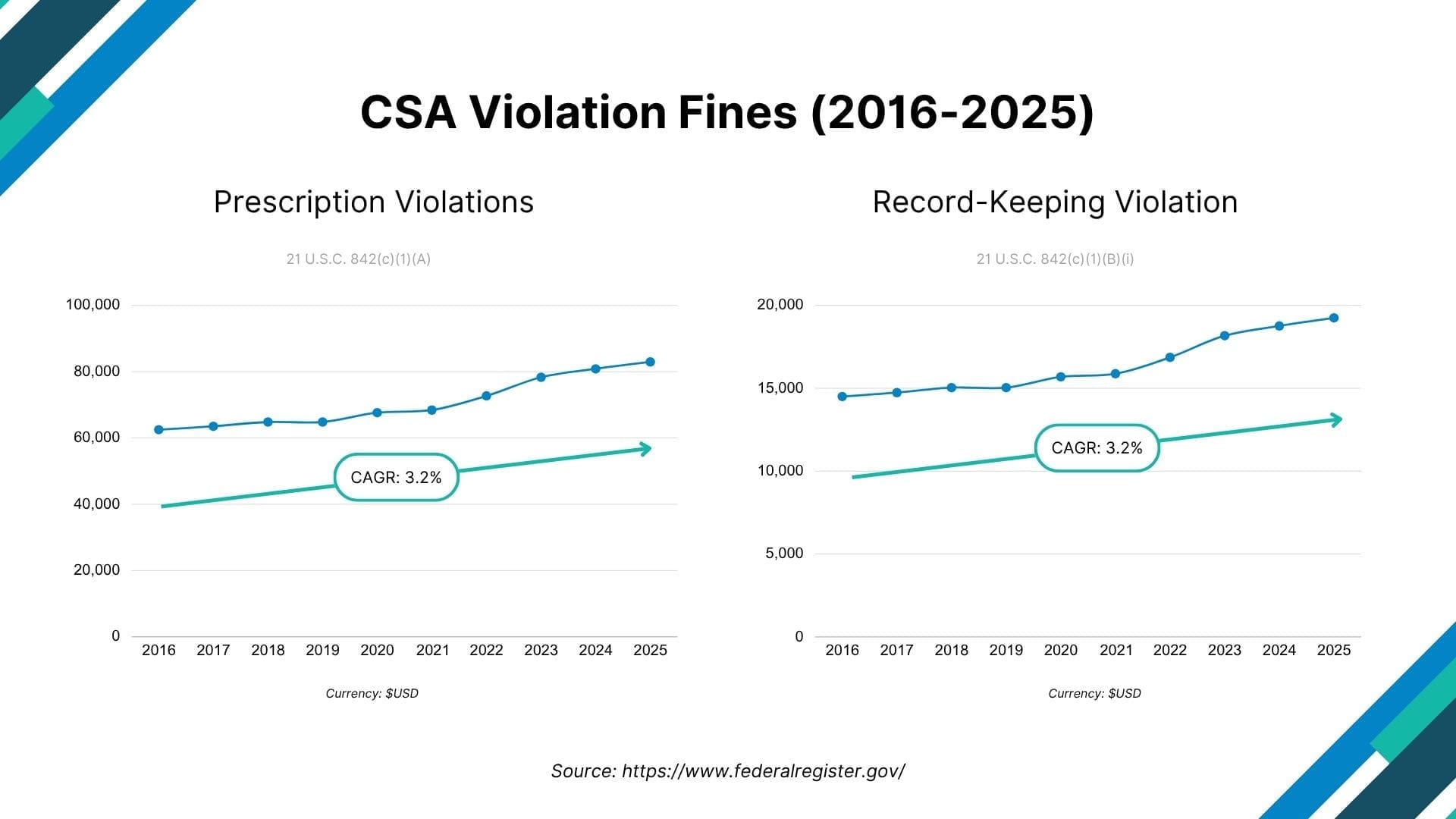For pharmacies, maintaining strict compliance with the Controlled Substances Act (CSA) is not just a matter of best practice but a crucial requirement for avoiding significant financial and operational repercussions. Recent trends show a sharp rise in controlled substance penalties regarding civil fines, underscoring the need for pharmacies to stay vigilant.
In this blog, we’ll examine the increasing costs of CSA violations, the key factors driving this trend, common compliance pitfalls, and why staying compliant is more critical than ever. Plus, we’ll explore how a specialized compliance solution like C2 Keep can help pharmacies reduce risk and avoid costly civil fines.
Current CSA Violation Fees

Staying up to date on civil fines relating to the CSA is more challenging than it seems. These fines can change with little notice, and beyond federal CSA requirements, individual states often impose their own regulations. As a result, many pharmacists underestimate the true financial and operational risks associated with controlled substance penalties.
As of July 2025, civil fines for CSA record-keeping violations have risen to $19,246 per violation, while prescription-related fines have surged to $82,950. This represents about a 28% increase from 2020, when record-keeping fines were $15,040 per violation and prescription fines were $64,820.
For independent pharmacies already struggling with low reimbursement rates and Direct and Indirect Renumeration (DIR) fees from Pharmacy Benefit Managers (PBMs), controlled substance penalties of this scale can be devastating. But what’s behind the steady rise in fines over the past five years?
Why Civil Fines Are Going Up?
It’s no surprise that the ongoing opioid crisis is the driving force behind rising civil fines. According to the Drug Enforcement Agency (DEA), despite the Centers for Disease Control and Prevention (CDC) reporting a steady decline in opioid overdose deaths in recent years, enforcement efforts remain as aggressive as ever. The DEA, responsible for enforcing CSA regulations, has made it clear that combating opioid misuse remains a top priority. While progress is being made, the crisis continues to pose a significant threat, requiring sustained efforts to protect and educate both current and future generations.
By increasing civil fines, the government aims to push pharmacies toward taking more precautions when it comes to managing controlled substances. While higher controlled substance penalties may encourage greater caution, many pharmacies unknowingly make compliance mistakes, leaving them vulnerable to costly violations.
Common Reasons for Controlled Substance Penalties
There are many factors that can lead to controlled substance penalties, some more common than others. While some cases involve intentional violations, most penalties occur simply due to disorganized workflows. In many cases, by the time the DEA arrives for an inspection, pharmacies have little opportunity to correct compliance issues, resulting in serious consequences.
Here are some of the most common reasons pharmacies incur controlled substance penalties:
- Financial Limitations: Even if pharmacies want to improve CSA compliance, they may not have the finances needed to invest in proper tools or qualified personnel.
- Outdated Processes: Manually managing controlled substances is not only time consuming, it also increases the likelihood of errors and theft going unnoticed.
- Insufficient Training: Pharmacists and staff may not take the time to partake in proper CSA compliance training due to competing priorities.
- Lack of Knowledge: The complex and ever-changing nature of CSA regulations makes it difficult for pharmacies to understand and keep up.
- Differing State & Federal Requirements: Some states have stricter regulations, putting more work and responsibility on pharmacists and their staff.
- Siloed Workflows: Disconnected systems and lack of effective communication make it easy for information to slip through the cracks.
To learn more about the challenges pharmacies face in maintaining CSA compliance, click HERE!
The Importance of Staying Compliant
While avoiding hefty fines is a strong motivator, CSA compliance goes beyond financial concerns. Here’s why pharmacies must make compliance a top priority:
- Ensuring Patient Safety: Proper compliance helps prevent drug diversion and misuse, ensuring patients receive the correct medications and dosages while reducing the risk of controlled substances falling into the wrong hands.
- Protecting Reputation: Compliance violations can lead to DEA enforcement actions and publicized penalties, damaging a pharmacy’s reputation, driving away customers, and making it harder to secure insurance.
- Maintaining Licensure: Serious violations can result in the suspension or revocation of a pharmacy’s DEA registration and state pharmacist license, jeopardizing its ability to operate.
- Avoiding Civil Liability: Compliance failures can expose pharmacies to civil lawsuits, adding legal and financial burdens that can be difficult to recover from.
How C2 Keep Can Help
C2 Keep is a fully integrated, cloud-based solution designed to help pharmacies maintain CSA compliance, reduce the risk of fines, and improve operational efficiency. Founded by former pharmacy director Roland Achenjang, who experienced the challenges of audits firsthand, C2 Keep is built on deep industry expertise to address the unique compliance needs of pharmacies.
Here’s how C2 Keep helps pharmacies take control of their controlled substances management:
- Time-Saving Automation: Eliminate manual processes and free up valuable time for improving workflows and staff training.
- Real-Time Inventory Insights: Maintain complete and accurate records of controlled substances inventory, making it easy to identify and resolve discrepancies.
- Enhanced Security & Accountability: Built-in safeguards improve staff accountability and reduce the risk of drug diversion.
- Effortless Compliance Reporting: Generate federal and state-mandated reports in seconds, ensuring a seamless experience during DEA audits.
- Simplified Document Management: Instantly retrieve DEA 222 / CSOS documents and other critical order files, streamlining inspections for both state and federal auditors.
- Scalable for Any Pharmacy: Whether independent or part of a larger network, C2 Keep adapts to evolving regulations and growing compliance needs.
By leveraging these features with C2 Keep, pharmacies can minimize compliance risks, prevent costly violations, and operate with confidence.
Conclusion
As controlled substance penalties continue to rise, pharmacies must make compliance a top priority. Implementing a digital compliance solution like C2 Keep ensures accurate record-keeping, strengthens security, and simplifies reporting, helping pharmacies stay ahead of regulatory requirements. By taking a proactive approach, pharmacies can protect themselves from costly civil fines, operational disruptions, and reputational damage while continuing to provide safe, high-quality care to their patients.
Last Updated: August 7th, 2025
